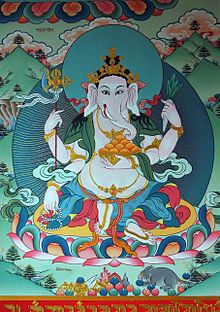| Revision as of 14:49, 1 January 2024 edit Redtigerxyz (talk | contribs)Autopatrolled, Extended confirmed users, File movers, Pending changes reviewers, Rollbackers69,040 edits Talk:Vināyaka#Main_page_for_the_Buddhist_Ganesh/Ganapati/Vināyaka - split from KangitenTags: harv-error Visual editNext edit → |
| (No difference) |
Revision as of 14:49, 1 January 2024
| Vināyaka (Gaṇapati) | |
|---|---|
| God of obstacles, bliss, protection, wealth, and success | |
 Vinayaka painting from Nepal Vinayaka painting from Nepal | |
| Affiliation | Deva Vairochana Buddha Eleven-Headed Avalokiteshvara Amritakundalin Sanbō Kōjin |
| Weapon | axe, trident |
| Gender | Male |
| Genealogy | |
| Parents |
|
| Equivalents | |
| Hindu | Ganesha |
Vināyaka (IAST; Jp. Binayaka, 毘那夜迦), Vighnāntaka, or Gaṇapati (Jp: Ganabachi, 誐那鉢底; Tibetan: tshogs bdag) is a Buddhist deity venerated in various traditions of Mahayana Buddhism. He is the Buddhist equivalent of the Hindu god Ganesha. In Tibetan Buddhism he is also known as the Red Lord of Hosts (Tibetan: tsog gi dag po, mar po). In Japanese Buddhism he is also known as Kangiten (Template:Lang-ja, "god of bliss"; Sanskrit (IAST): Nandikeśvara) or Shōten (聖天, lit. "sacred god" or "noble god").
- "Ganapati (Indian God & Buddhist Deity) - Red (4 hands) (Himalayan Art)". www.himalayanart.org. Retrieved 2023-12-30.
- Buhnemann (2006), pp. 19–20. sfnp error: no target: CITEREFBuhnemann2006 (help)
- ^ Hanan (2003), pp. 245–6. sfnp error: no target: CITEREFHanan2003 (help)
- Krishan (1999), p. 163. sfnp error: no target: CITEREFKrishan1999 (help)
- Frédéric (2002), p. 470. sfnp error: no target: CITEREFFrédéric2002 (help)
- "歡喜天 (Gaṇeśa)". Digital Dictionary of Buddhism. Retrieved 2021-06-02.
- Pandey, Rajyashree (22 February 2007). "Performing the body in medieval Japanese narratives: Izumi Shikibu in Shasekishū". Japan Forum. 19 (1): 119. doi:10.1080/09555800601127361. S2CID 143714073.